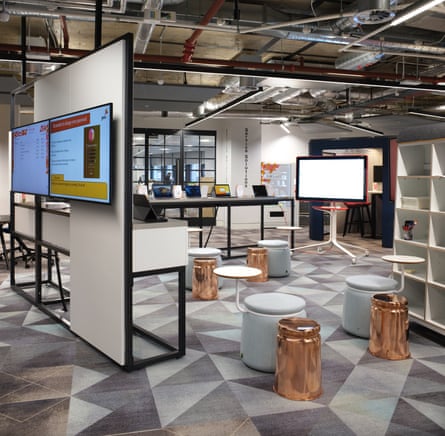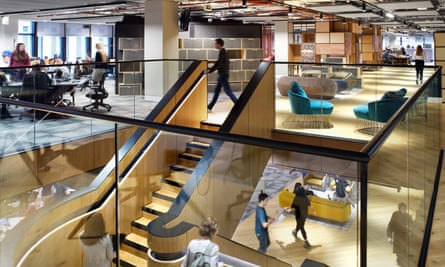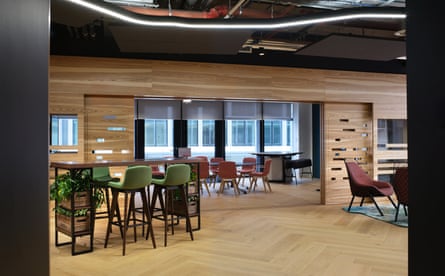No more fomo: top firms turn to VR to liven up meetings
Staff at accounting giant PricewaterhouseCoopers have been holding meetings in odd places: the top of skyscrapers, inside swanky penthouse apartments and even luxury ski chalets. All without leaving the comfort of their own homes.
That is the new normal for a growing number of workers at PwC, which is buying thousands of virtual reality headsets to help battle Zoom fatigue and level the playing field for employees barred from entering the same room during the Covid outbreak.
It is latest example of how firms are adapting to remote working, after the Covid-19 epidemic cancelled international client meetings and consigned white-collar workers to their kitchen tables. A recent poll by recruiter Robert Half found that 89% of businesses expect hybrid working – split between home and office – to become permanent after the pandemic, prompting investment in new technology, and offices that can offer more to staff than a desk and a wifi signal.
“What’s interesting is you’ve had a bunch of technologies around to enable remote working for quite a while,” Nick South, a partner and expert in the future of work at Boston Consulting Group (BCG), said. “It took this mass shift to remote work in general for firms to say ‘Oh, actually, let’s try and apply it at scale’.”
PwC first piloted the use of VR headsets in the UK in 2017, but after the pandemic forced its 22,000 staff to work from home, it accelerated hybrid working plans. Its UK operation is already running two to three team meetings via VR each week. Over the next 18 months, it is spending £75m to redesign offices with cafe-style meeting areas and equip staff with new tech. That will include higher grade microphones, video meeting screens, and doubling its own cache of VR headsets to 400 by the end of the year, to help remove the disadvantage of logging in from home.
 View image in fullscreenCopper stools? Not your average accountancy firm office. Photograph: Philip Vile/PwC
View image in fullscreenCopper stools? Not your average accountancy firm office. Photograph: Philip Vile/PwC
“If you’re the only person on [Google] Hangouts, you’re guaranteed new elements of a ‘fear of missing out’,” PwC UK’s chief executive, Kevin Ellis, said. “Therefore, it’s really important that our meeting rooms are able to level the playing field.”
One PwC staffer recalled leading a presentation for a furniture company through its VR headsets. Held in the grand hall of a virtual conference centre, participants were able to conjure furniture designs out of thin air and allow clients to view them in real time.
“It’s really quite strange but very interesting,” Ellis said, adding that he hopes new tech will help cut down on international travel post-pandemic, and improve work-life balance by reducing commuting.
BCG’s own research found that 86% of UK workers claimed to have benefited from remote working, saying they were less distracted and had a better work-life balance.
 View image in fullscreenPwC is planning to redesign its UK offices in a similar style to its Birmingham site, seen here, which was recently refurbished. Photograph: Philip Vile/PwC
View image in fullscreenPwC is planning to redesign its UK offices in a similar style to its Birmingham site, seen here, which was recently refurbished. Photograph: Philip Vile/PwC
However, 79% also experienced negative impacts, including anxiety, loneliness and increasingly blurred boundaries between home and work. There is also a risk that staff – especially those under 35 – feel less visible to bosses, and miss out on informal training by being around their peers and seniors along the way. “The thing that people have really struggled with is on-the-job learning and apprenticeship, which you do get by being side-by-side and face-to-face with colleagues,” South said.
Nicholas Bloom, British economist at Stanford University, has been researching the effects of home working for years before the pandemic hit. He strongly advises that companies offer remote working at least one or two days a week. His own surveys found that staff preferred the arrangement, and would probably demand 8% higher pay if refused. They were also more productive, which was good for the corporate bottom line.
However, Bloom advises against letting staff ditch the office entirely.
Working from home is like beer or wine – it is great in moderation but is not so great in excess. One to three days a week seems to be the sweet spot. A few firms are planning five days a week post-pandemic but I think that is risky and problematic. It is hard to innovate remotely, it is hard to maintain company culture and it can make employees feel lonely and isolated.”
Some firms such as digital bank Revolut are now overhauling offices to push more of its staff together after the Covid pandemic recedes.
The fintech firm is redesigning all 23 of its global sites – including its headquarters in London’s Canary Wharf – by halving the number of individual desks from about 2,800 to roughly 1,400 over the next few years. It will instead dedicate 70% of office space for meeting rooms and group seating, while reserving some “quiet zones” for staff.
 View image in fullscreenPwC’s working environment. Photograph: Philip Vile/PwC
View image in fullscreenPwC’s working environment. Photograph: Philip Vile/PwC
While this will help reduce square footage in some offices, Revolut said it was not a cost-cutting exercise and would only represent “marginal savings”.
“In most cases, people are not primarily looking at [hybrid working arrangements] from a cost point of view. They’re fundamentally thinking, ‘How do we as an organisation want to work in the future’?” South said.
Earlier this month, the 335-year-old insurance market Lloyd’s of London launched a consultation into how its iconic Grade I-listed building at 1 Lime Street will be used after the pandemic.
The market – which hosted 6,000 of its 45,000 workers, brokers and underwriters on any given day before Covid – is asking how members plan to use spaces that are usually booked for meetings, training and events, as well as its cafe and wellness centre (reserved for yoga, meditation and simple medical issues) given hybrid-working plans and the “career aspirations” of their members.
Sign up to the daily Business Today email or follow Guardian Business on Twitter at @BusinessDesk
Lloyd’s is also reviewing the “future purpose and role” of its physical underwriting room, which has been off limits for most of the pandemic and temporarily replaced with a digital version that helped shift more of its complex insurance negotiations online last year.
Firms that fail to consider hybrid working models not only risk losing talented workers to more progressive employers, but are also cutting themselves off from a more diverse pool of staff, who might – for example – live outside London but would consider commuting twice a week.
“The expectations are shifting quite fast, and the examples of people doing things differently are appearing all the time. So actually, [businesses] need to start doing their thinking now,” South said.





